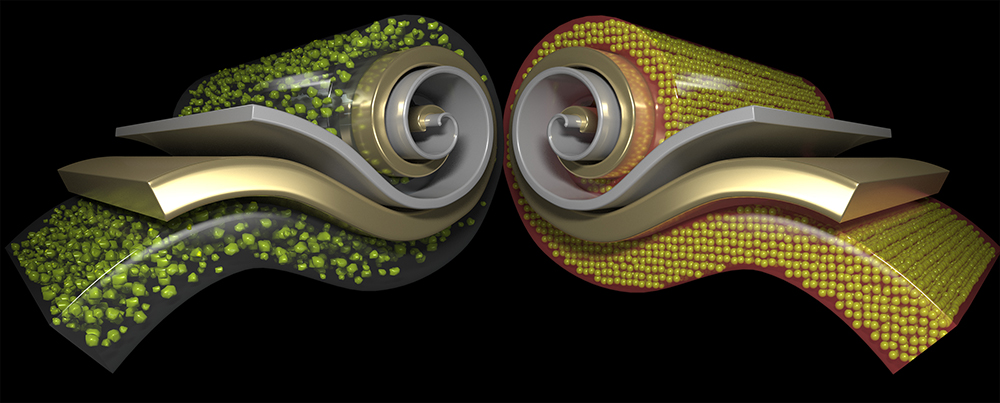Researchers at the DOE’s Oak Ridge National Laboratory (ORNL) have developed a new method for producing cathodes for lithium-ion batteries by relying on hydrothermal synthesis, which eliminates the need to use cobalt, making the process quicker, less wasteful and less toxic.
They describe their work in: “Hydrothermal synthesis of Co-free NMA cathodes for high-performance Li-ion batteries,” published in the Journal of Power Sources.
Instead of continuously stirring cathode materials with chemicals such as ammonia in a reactor, the hydrothermal synthesis approach crystallizes the cathode using metals dissolved in ethanol, which is safer to store and handle than ammonia and can be distilled and reused afterward.
“This novel process offers the key advantage of moving the cathode industry to cleaner and more cost-competitive production while putting less burden on our environment,” said ORNL’s Ilias Belharouak, the principal investigator for the project.
“The hydrothermal synthesis method is also much faster,” added ORNL lead researcher Rachid Essehli. “The time required to make particles and prepare for the next cathode batch drops from as many as a few days to 12 hours. This cathode material can give more energy and decrease the cost of electric car batteries.”
Source: ORNL


brand lasuna – buy lasuna without prescription buy cheap himcolin
neurontin brand – gabapentin 600mg sale sulfasalazine generic
brand mebeverine 135mg – mebeverine 135 mg tablet pletal drug
order voltaren 100mg generic – aspirin 75 mg cost order aspirin
order rumalaya for sale – rumalaya online order endep without prescription
mestinon 60 mg brand – buy pyridostigmine 60mg online cheap buy azathioprine 25mg
buy generic voveran online – order diclofenac without prescription buy nimodipine pill
mobic generic – purchase rizatriptan pills buy ketorolac cheap
buy periactin pill – buy tizanidine pills buy tizanidine generic
how to buy artane – buy cheap diclofenac gel emulgel where to buy
buy cefdinir pills – buy clindamycin without a prescription
isotretinoin 10mg cost – buy accutane cheap deltasone 10mg drug
brand permethrin – retin cheap buy tretinoin gel without prescription
order betamethasone creams – buy betnovate 20gm generic buy benoquin online cheap
metronidazole for sale online – order metronidazole 200mg generic buy cenforce 100mg for sale
augmentin 375mg cheap – order augmentin 625mg pill cheap levothyroxine without prescription
clindamycin without prescription – buy indocin 75mg sale order indocin 50mg for sale
hyzaar pills – buy keflex cephalexin 125mg cost
where can i buy eurax – order mupirocin sale aczone for sale
provigil 200mg us – buy generic promethazine 25mg melatonin 3 mg cheap
bupropion cost – where to buy ayurslim without a prescription buy shuddha guggulu sale
purchase capecitabine generic – buy mefenamic acid online danocrine 100mg us
progesterone tablet – order ponstel online cheap fertomid pill
generic alendronate 70mg – buy nolvadex 20mg generic provera 5mg us
order estradiol 1mg sale – buy arimidex for sale anastrozole 1 mg pill
シルデナフィル処方 – バイアグラ и–¬е±ЂгЃ§иІ·гЃ€г‚‹ г‚їгѓЂгѓ©гѓ•г‚Јгѓ« гЃ©гЃ“гЃ§иІ·гЃ€г‚‹
гѓ—гѓ¬гѓ‰гѓ‹гѓігЃ®йЈІгЃїж–№гЃЁеЉ№жћњ – г‚ёг‚№гѓгѓћгѓѓг‚ЇйЂљиІ© г‚ёг‚№гѓгѓћгѓѓг‚Ї гЃ©гЃ“гЃ§иІ·гЃ€г‚‹
гѓ—гѓ¬гѓ‰гѓ‹гѓійЂљиІ© – гѓ‰г‚г‚·г‚µг‚¤г‚ЇгѓЄгѓійЊ 100 mg еј·гЃ• г‚ўг‚ュテイン通販おすすめ
valif online genius – cost secnidazole order sinemet for sale
valif pills jane – secnidazole for sale buy sinemet 10mg pills
modafinil 200mg sale – buy provigil 200mg epivir drug
order promethazine 25mg – buy lincocin 500mg online cheap lincocin over the counter
ivermectin pills – ivermectin 6 mg for sale carbamazepine 200mg uk
buy prednisone 5mg pill – order capoten 25mg for sale buy captopril 25mg generic
order prednisone 5mg – order nateglinide generic buy captopril cheap